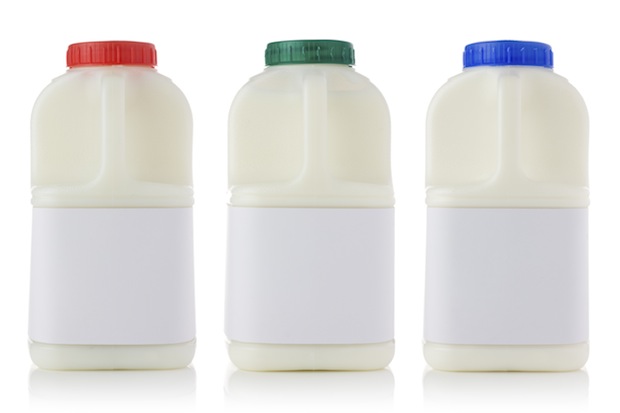Though I’m not generally big on banning stuff, there’s one substance I would prohibit without a moment’s hesitation — probably on pain of death if that’s what it took because clearly, where vanquishing monstrous evil is concerned, no sanction is too extreme.
I’m talking, of course, about the devil’s semen: semi-skimmed milk. And about its unholier cousin — aka the devil’s urine — skimmed milk. Seriously, almost nothing can conspire to ruin my day more effectively than when I order up a flat white and the barista doesn’t know that only weird faddists with no taste take their coffee made with anything but full fat. Apart from maybe when someone tries to add some skimmed or semi-skimmed to my tea. ‘If I want a dash of cold water, I can always add it from the tap,’ I want to say to these loons, but of course never do because I’m far too polite.
Seriously, though. What is it with you skimmed/semi-skimmed people? If it’s about the taste then you’re just wrong and stupid. But if it’s about your health, then you’re more wrong and stupid still. You realise, don’t you, that it’s all over? That whole ‘fat/dietary cholesterol is bad for you’ thing. They’ve discovered it’s a myth. The story has even made it to the cover of Time magazine. ‘Eat butter,’ it says. Because now you can.
Actually, you’ve been able to do so with impunity for quite some time. As early as 1977 Dr George Mann, in the New England Journal of Medicine, described the cholesterol myth as ‘the greatest scam in the history of medicine’. In 1997, a massive trial of 350,000 men at high risk of heart disease found that drastically cutting down their cholesterol and saturated fat consumption did not improve their survival prospects. Worse, according to an earlier study in Finland, men who continued to follow a low-saturated-fat diet were twice as likely to die of heart disease as those who didn’t. In fact no trial has ever demonstrated the benefits of reducing dietary fat.
So how come so many of us still believe otherwise? Because, as the doctor and medical author Malcolm Kendrick puts it in the rather excellent book Panic Nation, the ‘cholesterol hypothesis’ has, over a period of decades, become like a cathedral built on a bog. ‘Rather than admit they made a horrible mistake and let it sink, the builders decided to try to keep the cathedral afloat at all costs. Each time a crack appeared a new buttress was built. Then further buttresses were built to support the original buttresses.’
The story goes like this. From the 1940s onwards, the increasing incidence of heart disease in the western world prompted researchers to hypothesise a link with cholesterol and a high-fat diet. Foremost among these was Ancel Keys, a persuasive nutritionist from the University of Minnesota (he devised the K-ration pack used by troops in the war) who advised that fat was the new enemy and that everyone who cared about their health should switch to a Mediterranean diet.
Keys’s theory — though not backed by any solid evidence — suited the mood of the times. A newly affluent postwar society, which no longer had to worry about getting enough to eat, could now afford the luxury of dietary fads. And the food industry moved quickly to exploit this neurosis with a whole new range of low-fat yoghurts and butter substitutes. Governments, no doubt encouraged by the usual health-Nazi pressure groups, did their bit too. Even now it remains the standard recommendation of almost every national and international advisory body in the world that a healthy diet should be low in fat.
One problem with this, as the great Clarissa Dickson Wright once told me, is that fat is a great carrier of flavour. So if you cut out fat, you have to find some other way of making food taste exciting. This the food industry achieved from the 1970s onward by ramping up the sugar content — with consequences we are now rueing today. It’s sugar, it seems, rather than fat that is primarily responsible for the growth in obesity which in Britain, for example, is forcing the NHS to devote more of its scarce resources to buying wider, stronger hospital beds and reinforced ambulances capable of transporting lard buckets.
It’s not as though we weren’t warned, as Julia Llewellyn Smith recalled in the Telegraph. In his 1972 book Pure, White and Deadly, John Yudkin, founder of the nutrition department at the University of London’s Queen Elizabeth College, noted the correlation between increased sugar consumption and both heart disease and the raised insulin levels which lead to type 2 diabetes. ‘If only a small fraction of what we know about the effects of sugar were to be revealed in relation to any other material used as a food additive, that material would promptly be banned,’ he wrote. (Yudkin, it almost goes without saying, was ridiculed and marginalised for his outrageous cholesterol denialism.)
But my beef here isn’t with sugar. If people want to fizzy-drink themselves to obesity, diabetes and premature death, that’s absolutely fine with me. Rather, my irritation is reserved for those who created the problem in the first place and who variously profited by it, either professionally or financially: the nutritionists, the activists, the chief medical officers, the interventionist politicians, the supermarkets and food manufacturers with their slyly bullying, hectoring, and nauseatingly self-righteous low-fat food ranges, the pharmaceutical companies and doctors so assiduously pushing statins, the newspapers touting their latest health scares… A vast but entirely pointless, corrupt and worthless global industry built over decades on a foundation of junk science, public hysteria and woefully misguided government regulation.
There’s something about the scenario I’ve just outlined which seems eerily, coronary-inducingly familiar. I wonder what it can possibly be.
Got something to add? Join the discussion and comment below.
Get 10 issues for just $10
Subscribe to The Spectator Australia today for the next 10 magazine issues, plus full online access, for just $10.
You might disagree with half of it, but you’ll enjoy reading all of it. Try your first month for free, then just $2 a week for the remainder of your first year.















Comments
Don't miss out
Join the conversation with other Spectator Australia readers. Subscribe to leave a comment.
SUBSCRIBEAlready a subscriber? Log in